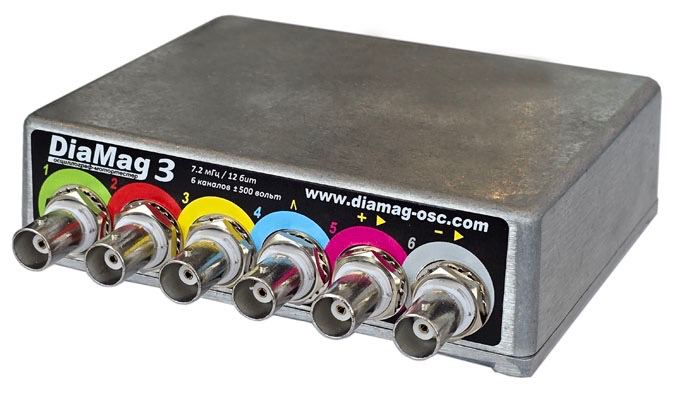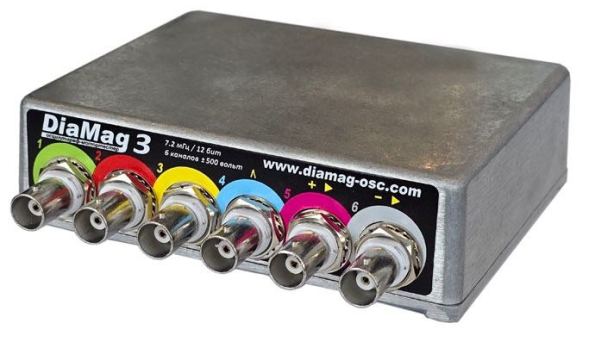

Motortester DIAMAG 3 Full
Item no.: 31D1000

- Motortester DIAMAG3 (with patch cord)
- First cylinder sensor (blue marks)
- Cylinder pressure sensor with cable (20 bar)
- Sensor "Classic"
- Vacuum sensor
- DIS6 sensors
- Capacitive plate sensor
- Inductive express sensor

Diamag 3 is a professional motor tester for fast and accurate fault detection in any engine of any car. The Diamag 3 software has all the functions that a modern motor tester should have. The six-channel oscilloscope is able to check the ignition and valve systems, the correct installation of the belt or timing chain, compression, scroll current and other parameters.
The device has a very durable aluminum housing that will protect it from mechanical damage. The case is also a shield against interference. The device has a low level of its own noise.
The main differences between Diamag 3 and Diamag 2:
- All channels now have 1 MHz bandwidth.
- The maximum digitization frequency is 7.2 MHz:
- 7.2 MHz (in single-channel mode)
- 3.6 MHz (in 2-channel mode)
- 2 MHz (in 3-channel mode)
- 1 MHz (in 4...6 channel mode)
- The bit depth of the ADC is 12 bits.
- There is a galvanic isolation for power supply.
- The 6th and D have an additional amplifier 2, 5, 10 times.
- In order to increase noise immunity, the transition from the USB interface to a network 100 Mbit Ethernet was carried out. The new motor tester can be connected directly to a computer, as well as to a Wi-Fi router, which is very convenient — your laptop is not wired to a Diamag. With this connection, a 5 volt cell phone power supply can be used to power the device.
- The device does not require drivers, as it uses a network interface.
- The device is powered via a network patch cord from a free USB port.
- When using channel 4, an additional slow ADC is used to synchronize with the peak detector turned on, so that the synchronization channel does not affect the overall digitization frequency.
- Power protection has been made, nothing will happen with a short-term reverse polarity of the power supply. During prolonged operation, only the protective resistor will fail.
Technical characteristics
|
Analog channels |
|||
| Number of universal analog channels: | 6 (1 MHz band) | ||
| The number of channels simultaneously turned on: | 6 | ||
| The number of hardware sub-bands of the channel: | 12 | ||
| Hardware sub-bands of the channel: | ±0.1, ±0.3, ±0.5, ±1, ±2, ±5, ±15, ±30, ±50, ±100, ±200 и ±500 V | ||
| Additional amplifiers x1, x2, x5, x10: | in channels 6 and D | ||
| Input active resistance of the channel: | at least 1 MOm | ||
|
Synchronization channel |
|||
| Number of synchronization channels: | 1 | ||
| Operating modes: | peak detector | ||
|
Maximum sampling rate |
|||
|
7.2 MHz (in 1-channel mode) 3.6 MHz (in 2-channel mode) 2 MHz (in 3-channel mode) 1 MHz (in 4...6-channel mode) |
||
|
ADC bit rate |
|||
| In the oscilloscope and recorder mode: | 12 bit | ||
|
Гальваническая развязка |
|||
| Insulation test voltage: | 1KV for 60 seconds | ||
| Insulation resistance: | not less than 1000 MOm | ||
| Insulation capacity: | not higher than 60 pF | ||
|
Operating modes |
|||
| Oscilloscope and Recorder | |||
|
Power supply |
|||
| Supply voltage: | +5 Volt(4.6….5.5) | ||
| Power consumption: | not more than 1.5 W | ||
| Galvanic power isolation: | yes | ||
|
Other technical specifications |
|||
| PC communication interface: | Ethernet 100M (cable length 5-20 m) | ||
| Overall dimensions of the measuring unit: | 120×93×34 mm | ||
| Weight of the measuring unit: | 0.315 kg | ||
The technical support is provided by the developer.








